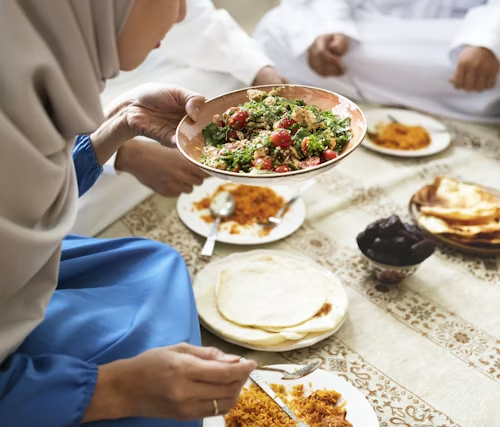Ramadan diet plans to lose 10kg.
Ramadan is a special month for millions of Muslims around the world. It is a time of spiritual reflection, increased devotion, and fasting from dawn to sunset. While fasting during Ramadan has numerous health benefits, it can also be an opportunity to shed some pounds if done right. Many people aim to lose weight during this month but often find it challenging due to irregular eating habits and a lack of healthy food choices.
we’ll discuss how you can follow a diet plan that helps you lose 10kg during Ramadan, while also making sure you stay energized, healthy, and spiritually focused.
Ramadan and Its Impact on Weight Loss
What is Ramadan and why do people fast?
- The spiritual significance of fasting.
- Fasting hours: dawn to sunset.
- Why do some people gain weight and others lose it during Ramadan?
The Basics of Weight Loss
- How weight loss works: calorie deficit.
- Role of metabolism during fasting.
- How fasting affects fat-burning.
Ramadan’s Unique Weight Loss Opportunity
- Fasting increases fat-burning potential.
- Improved insulin sensitivity during fasting.
- Benefits of intermittent fasting for weight loss.
- The importance of hydration and eating balanced meals.
Setting Realistic Goals for Weight Loss During Ramadan
Understanding Your Target: Losing 10kg
- Healthy weight loss: 0.5kg to 1kg per week.
- Setting achievable goals for the month.
- Tracking progress: weight, measurements, and energy levels.
Creating a Plan of Action
- Determining your calorie needs for weight loss.
- How much to eat during Suhoor and Iftar?
- Meal timing and portion control.
- Importance of physical activity in conjunction with fasting.
A Healthy Ramadan Diet Plan to Lose 10kg
Suhoor: The Pre-Dawn Meal
- Importance of Suhoor for sustaining energy throughout the day.
- Best foods to eat at Suhoor for weight loss.
- Protein-rich foods (eggs, yogurt, cottage cheese).
- Whole grains (oats, whole wheat bread).
- Healthy fats (avocados, nuts, seeds).
- Fruits and vegetables for hydration and fiber.
- Foods to avoid at Suhoor.
- Sugary, processed foods.
- Highly salty foods that cause dehydration.
Iftar: The Breaking of the Fast
- Importance of Iftar: rehydrating and replenishing energy.
- Healthy foods to break your fast.
- Dates for a natural sugar boost.
- Lean protein (chicken, fish, tofu).
- Healthy fats (olive oil, nuts, seeds).
- Hydrating foods (watermelon, cucumbers, soups).
- Foods to avoid at Iftar.
- Fried and fatty foods (samosas, pakoras).
- Sugary desserts (baklava, qatayef).
- Refined carbs (white bread, sugary beverages).
Dinner: Light, Healthy, and Filling
- The importance of a light, nutritious dinner after Iftar.
- Options for dinner: grilled chicken, salads, vegetable soups.
- Avoid overeating and late-night snacking.
Snacks and Hydration
- How to stay hydrated throughout the night.
- Healthy snacks for post-Iftar (nuts, fruits, yogurt).
- Avoid sugary drinks like sodas and juices.
Balanced Macronutrients: A Key to Losing 10kg
- Importance of protein, healthy fats, and complex carbs.
- How to balance your meals for maximum fat loss.
Exercise and Physical Activity During Ramadan

The Best Time to Exercise During Ramadan
- Early morning or after Iftar: timing your workouts.
- How exercise affects energy levels during fasting.
Types of Exercise for Weight Loss
- Low-intensity cardio (walking, swimming).
- Strength training (light weights, bodyweight exercises).
- Yoga and stretching for flexibility and relaxation.
Staying Active While Fasting
- Tips to avoid dehydration during exercise.
- How to manage energy levels.
- Why rest and sleep are just as important as exercise.
Maintaining Healthy Habits and Motivation
Mindful Eating and Portion Control
- How to practice mindful eating during Ramadan.
- Eating slowly to avoid overeating.
- Portion control tips for both Suhoor and Iftar.
Dealing with Cravings and Emotional Eating
- Strategies to manage food cravings during Ramadan.
- Using fasting as a tool for self-discipline.
- How to stay motivated and focused on your goal.
Sleep and Recovery
- The importance of quality sleep during Ramadan.
- How poor sleep can impact weight loss?
- Tips for improving sleep quality during fasting hours.
Supplementation and Support
When to Consider Supplements
- Multivitamins, vitamin D, and electrolytes.
- Protein powders for an additional protein boost.
- Omega-3 supplements for heart health.
The Role of Hydration
- Importance of drinking enough water during non-fasting hours.
- How to stay hydrated without feeling bloated.
- The benefits of herbal teas and low-calorie drinks.
Seeking Support from Family and Friends
- How to stay motivated when fasting.
- The role of community in maintaining a healthy diet.
Overcoming Common Challenges During Ramadan
Fasting Fatigue and Low Energy Levels
How to boost energy levels naturally during Ramadan.
The importance of eating nutrient-dense foods.
Weight Plateau: What to Do When Weight Loss Slows Down
How to overcome a weight loss plateau.
Adjusting your calorie intake and exercise routine.
The importance of persistence and patience.
Social Gatherings and Special Occasions
How to navigate Iftar parties and social events.
Making healthier food choices in social situations.
Losing 10kg during Ramadan is achievable with the right approach. By combining a healthy, balanced diet with mindful eating, regular exercise, and proper hydration, you can achieve your weight loss goals while maintaining the spiritual and physical benefits of fasting. Remember to set realistic goals, be patient, and stay consistent. Ramadan is not just about physical transformation but also about improving your overall health and well-being.
Ramadan diet plans to lose 10kg.
How can I stay motivated during Ramadan?

Staying motivated during Ramadan, especially when you’re working toward a goal like losing weight or maintaining a healthy lifestyle, can be a challenge. The combination of fasting, altered routines, and social gatherings can sometimes make it harder to stay on track. However, with the right mindset and a few strategies, you can remain focused and motivated throughout the month. Here are some tips to help you stay motivated during Ramadan:
Set Clear and Achievable Goals
Having clear, specific goals will help keep you motivated and focused throughout Ramadan. Whether it’s losing 10kg or simply maintaining a healthy diet and exercise routine, knowing exactly what you’re aiming for makes it easier to stay committed. Break down your larger goal into smaller, more manageable milestones. For example, set weekly goals for weight loss or hydration, or aim to stick to your planned exercise routine a certain number of times each week.
Track Your Progress
Tracking your progress can be incredibly motivating. Keep a journal or use a fitness app to log your meals, exercise, and weight loss progress. Noticing positive changes, even small ones, will boost your confidence and encourage you to keep going. You can also track your energy levels, mood, and overall well-being. Seeing improvements in these areas can be just as motivating as physical changes.
Focus on the Bigger Picture
Remember that Ramadan is not just about physical transformation—it’s also a time for spiritual reflection, self-discipline, and personal growth. Keeping this bigger picture in mind can help you stay motivated when things get tough. Fasting teaches patience, gratitude, and mindfulness, and using Ramadan as an opportunity for both physical and spiritual self-improvement can keep you aligned with your goals.
Stay Connected with Supportive People
Having a support system can make a huge difference in staying motivated. Whether it’s family, friends, or an online community, surround yourself with people who encourage you to stay healthy and on track with your goals. You can share your progress with them, ask for advice, or simply vent when things get tough. When you’re surrounded by people who share your goals or are also striving to improve their health, the journey becomes easier and more enjoyable.
Be Kind to Yourself
Remember that perfection isn’t the goal—progress is. If you slip up or find yourself indulging in unhealthy foods or habits, don’t be too hard on yourself. Ramadan is about self-discipline, but it’s also about growth and reflection. Learn from moments of weakness and use them to fuel your determination moving forward. Self-compassion helps to reduce stress and discouragement, keeping your motivation high even when things don’t go as planned. Ramadan diet plans to lose 10kg.
Plan Your Meals and Exercise Routine
One of the best ways to stay on track during Ramadan is to plan. Knowing what you’re going to eat at Suhoor and Iftar, as well as scheduling your workouts, can eliminate decision fatigue and make it easier to stick to your goals. Prepping meals in advance ensures that you have healthy options available when hunger strikes, and having a clear exercise routine can help you stay active without feeling overwhelmed.
Celebrate Small Wins

It’s easy to get discouraged if you’re only focused on your end goal. Take time to celebrate small victories along the way—whether it’s sticking to your exercise routine, resisting an unhealthy food craving, or feeling more energized than you did a week ago. Recognizing and celebrating these wins can give you a sense of accomplishment and motivation to keep going.
Make It Enjoyable
Find ways to make your healthy habits enjoyable during Ramadan. If you’re exercising, choose activities you enjoy, like walking, swimming, or light yoga. If you’re following a diet, focus on creating meals that are both nutritious and delicious. When something feels enjoyable, you’re more likely to stick with it, so find ways to make healthy living a positive experience rather than a chore.
Visualize Your Success
Visualization is a powerful motivational tool. Take a few minutes each day to imagine how you’ll feel when you reach your goals. Picture yourself feeling stronger, healthier, and more confident, and think about the positive impact your efforts will have on your life during and after Ramadan. Visualizing success can help you stay focused and energized when you’re faced with challenges.
Practice Gratitude
Fasting during Ramadan teaches gratitude for the food, water, and comfort we often take for granted. This gratitude can also extend to your health journey. Be thankful for the ability to take care of your body and make positive changes during Ramadan. Gratitude helps to shift your focus from what you’re giving up to what you’re gaining, fostering a mindset of abundance and motivation.
Keep Your “Why” in Mind
Stay connected to the deeper reasons behind your goals. Whether it’s improving your health, strengthening your self-discipline, or simply feeling better in your body, remembering why you’re doing this will keep your motivation high. Whenever you face temptation or doubt, remind yourself of your deeper purpose and the benefits you aim to achieve physically and spiritually.
Reward Yourself (Smartly)
Sometimes, the best motivation comes from rewarding yourself for your hard work. However, it’s important to choose rewards that align with your goals. For instance, after a week of healthy eating and exercise, treat yourself to something you enjoy (but keep it healthy, like a non-sugary treat or a relaxing activity). When you associate positive rewards with your efforts, it reinforces your commitment. Ramadan dietplansn to lose 10kg.
Conclusion
Staying motivated during Ramadan can be challenging, but it’s achievable. By setting clear goals, tracking progress, staying connected with a supportive community, and focusing on the bigger picture, you can stay committed to your health and weight loss journey. Remember, Ramadan is about spiritual and physical growth, and maintaining a balanced mindset will help you stay motivated and successful throughout the month.
Frequently Asked Questions (FAQs)
Can I lose 10kg in one month during Ramadan?
Yes, it is possible, but it depends on various factors such as your starting weight, metabolism, and adherence to the diet plan. Aiming for 0.5kg-1kg per week is a healthy target.
How can I avoid gaining weight during Ramadan?
Focus on healthy, nutrient-dense foods, control portions, and avoid overeating at Iftar. Stay hydrated and incorporate regular physical activity.
What are the best foods to eat for Suhoor?
Protein-rich foods like eggs and yogurt, whole grains, healthy fats like avocado, and hydrating fruits and vegetables are ideal.
Is it okay to exercise while fasting during Ramadan?
Yes, light exercises like walking or stretching are great. Intense workouts should be reserved for after Iftar when you have more energy.
How can I stay motivated during Ramadan?
Keep a journal of your progress, set small achievable goals, and remind yourself of your health and fitness reasons for fasting.

